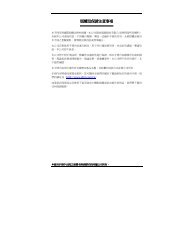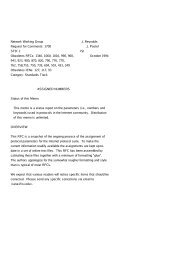Network Working Group R. Fielding Request for Comments: 2616 ...
Network Working Group R. Fielding Request for Comments: 2616 ...
Network Working Group R. Fielding Request for Comments: 2616 ...
You also want an ePaper? Increase the reach of your titles
YUMPU automatically turns print PDFs into web optimized ePapers that Google loves.
10.5.5 504 Gateway TimeoutThe server, while acting as a gateway or proxy, did not receive atimely response from the upstream server specified by the URI (e.g.HTTP, FTP, LDAP) or some other auxiliary server (e.g. DNS) it neededto access in attempting to complete the request.Note: Note to implementors: some deployed proxies are known toreturn 400 or 500 when DNS lookups time out.10.5.6 505 HTTP Version Not SupportedThe server does not support, or refuses to support, the HTTP protocolversion that was used in the request message. The server isindicating that it is unable or unwilling to complete the requestusing the same major version as the client, as described in section3.1, other than with this error message. The response SHOULD containan entity describing why that version is not supported and what otherprotocols are supported by that server.11 Access AuthenticationHTTP provides several OPTIONAL challenge-response authenticationmechanisms which can be used by a server to challenge a clientrequest and by a client to provide authentication in<strong>for</strong>mation. Thegeneral framework <strong>for</strong> access authentication, and the specification of"basic" and "digest" authentication, are specified in "HTTPAuthentication: Basic and Digest Access Authentication" [43]. Thisspecification adopts the definitions of "challenge" and "credentials"from that specification.12 Content NegotiationMost HTTP responses include an entity which contains in<strong>for</strong>mation <strong>for</strong>interpretation by a human user. Naturally, it is desirable to supplythe user with the "best available" entity corresponding to therequest. Un<strong>for</strong>tunately <strong>for</strong> servers and caches, not all users have thesame preferences <strong>for</strong> what is "best," and not all user agents areequally capable of rendering all entity types. For that reason, HTTPhas provisions <strong>for</strong> several mechanisms <strong>for</strong> "content negotiation" --the process of selecting the best representation <strong>for</strong> a given responsewhen there are multiple representations available.Note: This is not called "<strong>for</strong>mat negotiation" because thealternate representations may be of the same media type, but usedifferent capabilities of that type, be in different languages,etc.













